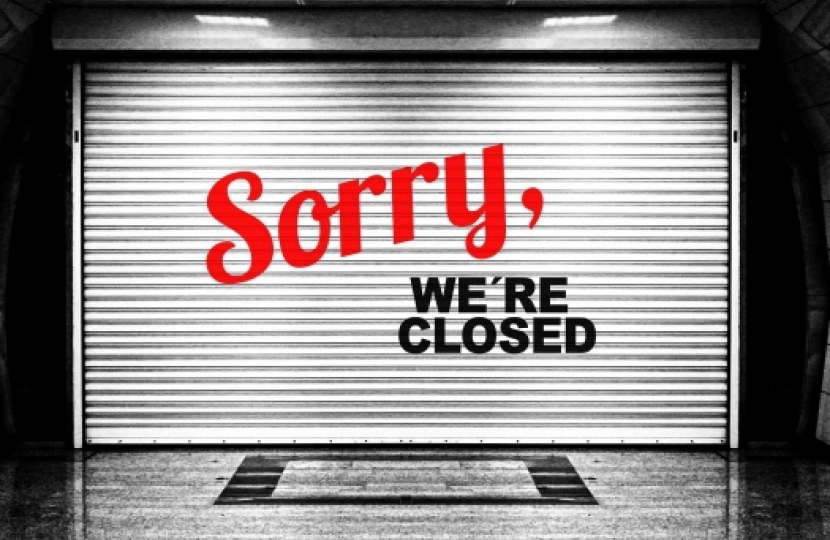
An Unofficial/Anecdotal Journey for SMEs from Cllr. Jason Perry, Conservative Spokesman on Jobs & Economy, LB Croydon
As the owner/operator of an SME myself I have found it difficult to piece together a complete picture of what is available to help businesses during this coronavirus pandemic.
I have put my thoughts together to try and, maybe, help others through this difficult period.
I MUST STRESS THAT I AM NOT A FINANCIAL OR BUSINESS ADVISER AND YOU SHOULD SEEK PROFESSIONAL ADVICE ON ALL THESE ISSUES.
I am simply attempting to throw some light on a very complex situation.
Talk to your bank, talk to your accountant, talk to an HR professional. Most importantly talk to your suppliers and creditors if you are facing difficulties. Talk to any providers that you may have credit agreements with to discuss payment holidays.
If your business is in lockdown do try and keep in touch with your staff, purely on a personal level. Have a coffee and a natter over ‘zoom’ or whichever ‘virtual’ system you use. It will be good for your morale and theirs and will give the opportunity to just ‘gossip’ as you would over a coffee break at work.
Maybe set up a work ‘Whatsapp’ group if you don’t have one already.
If you’re working from home for the first time do try and have a routine. For those of us that have never worked at home before this is a difficult adjustment.
The Government has clearly put together an unprecedented package of support for business and this is literally changing on a daily basis.
The London Growth Hub are doing 1-2-1 telephone sessions for businesses to help them navigate the support available:-
https://www.growthhub.london/covid-19-coronavirus-support-for-businesses-and-employers/
Below are some links which may prove useful:-
https://www.gov.uk/government/publications/guidance-to-employers-and-businesses-about-covid- 19/covid-19-support-for-businesses
https://www.croydon.gov.uk/healthsocial/phealth/coronavirus-information/business-support-and- advice
https://www.fsb.org.uk/campaign/covid19.html
https://www.icaew.com/insights/coronavirus
Of course, the situation is fast moving, so keep returning to the sites listed for updated news and sign up to those that offer e-mail updates.
Naturally many SMEs, like me, will be concerned about the financial stability of their business. It is fair to say that generally businesses only fail when there is little prospect of the business returning to profitability. In these circumstances if a business was viable before the outbreak there is every reason to hope and believe the business can return to profitability once the pandemic has passed. That’s certainly my hope! Sadly, some sectors are going to suffer more than others, but in the interim the biggest problem for many will be the lack of cash flow.
Below is a brief summary of the many support schemes now on offer:-
Coronavirus Job Retention Scheme
Under the new Coronavirus Job Retention scheme, government grants will cover 80% of the salary of PAYE employees who would otherwise have been laid off during this crisis. The scheme, open to any employer in the country, will cover the cost of wages backdated to 1 March 2020 and will be open before the end of April. It will continue for at least three months and can include workers who were in employment on 28 February.
To claim under the scheme employers will need to
• designate affected employees as ‘furloughed’ workers and notify employees of this change. Changing the status of employees remains subject to existing employment law and, depending on the employment contract, may be subject to negotiation. Remember that employees that are ‘furloughed’ cannot work for the business during this period.
• submit information to HMRC about the employees that have been ‘furloughed’ and their earnings through a new online portal. HMRC will set out further details on the information required.
• HMRC will reimburse 80% of furloughed workers wage costs, up to a cap of £2,500 per month. I understand that ‘on costs’ such as Employers’ NI and auto enrolment contributions are additional to the cap.
While HMRC is working urgently to set up a system for reimbursement, I understand existing systems are not set up to facilitate payments to employers. You may well need to pay your employees first, so businesses that need short-term cash flow support, may benefit from the VAT deferral or be eligible to apply for a Coronavirus Business Interruption Loan.
VAT Payments
The next quarter of VAT payments will be deferred, meaning businesses will not need to make VAT payments until the end of June 2020. Businesses will then have until the end of the 2020-21 tax year to settle any liabilities that have accumulated during the deferral period.
I understand that businesses will need to submit their returns in the normal way and will need to cancel their Direct Debit instruction if they wish to avail of the deferral. Otherwise payments will be taken as normal. VAT refunds and reclaims will be paid by the government as normal.
Income Tax Payments
Income Tax payments due in July 2020 under the Self-Assessment system will be deferred to January 2021. This is an automatic offer with no applications required. No penalties or interest for late payment will be charged in the deferral period.
Universal Credit
Self-employed people can now access full universal credit at a rate equivalent to statutory sick pay.
HMRC Time to Pay
HMRC’s Time to Pay scheme can enable firms and individuals in temporary financial distress as a result of Covid-19 to delay payment of outstanding tax liabilities. HMRC’s dedicated Covid-19 helpline provides practical help and advice on 0800 0159 559.
Self-Employment Income Support Scheme
• The scheme will pay 80% of individuals average monthly profits up to a maximum of £2,500 per month.
• This will be calculated on the last 3 years of trading profits and you must have submitted a 2019
Tax Return. Those who have only submitted one, or two, years may still apply.
• We do not yet have details of how to process applications, HMRC are currently designing a system to do this.
• The money should be available by the beginning of June.
• Those in partnerships are also eligible.
You are NOT eligible if
• The majority of your income does not come from a Partnership/Self-Employment.
• You have not submitted a 2018/19 Self-Assessment return, though I believe there is a small window of opportunity to file late, or did not start trading until after 5th April 2019.
• Your trading profits are above £50,000 per-year
Business Rates Holidays and Cash Grants
• No rates payable for the 2020-2021 tax year for any business in the retail, hospitality or leisure sectors.
• In those sectors, if your rateable value is between £15K and £51k, you'll also receive a cash grant
of up to £25,000 per property.
• Any business which gets small business rates relief, including those in the retail, hospitality or
leisure sectors, will receive a cash grant of £10,000 (increased from £3,000 announced in the 11 March Budget).
• Businesses will not need to apply for the grants that are available, however, they will need to verify
their bank details. A link should be sent to all qualifying businesses.
• The Council will contact all businesses that qualify for a grant based on their rateable value, ie, anyone under £51k.
Coronavirus Business Interruption Loan Scheme
• For small and medium-sized businesses, a new Coronavirus Business Interruption Loan Scheme (CBILS), delivered by the British Business Bank, will provide support for businesses to access a wide range of funding facilities including overdrafts, loans, asset finance and invoice finance.
• The government will provide lenders with a partial guarantee of 80% on each loan to give lenders
further confidence in continuing to provide finance to SMEs.
• The government will not charge businesses or banks for this guarantee, and the scheme will support loans of up to £5 million in value. The first 12 months of these loans will be interest and fee free, as the Government will cover these payments.
• Businesses will be able to get finance under the scheme from a large number of providers including the main high street banks.
Anecdotally my bank, one of the Big Four, have advised me that loans under £250k may not be subject to personal guarantees, but that generally a business would have needed to have been regarded as ‘viable’ three months ago in order to be considered.
• To be eligible for the scheme the business must be based in the UK, with turnover of no more than
£45 million per year.
• There is a quick eligibility checklist on the British Business Bank website to help businesses
understand if they are eligible to apply for a CBILS-backed facility,
• More information on the scheme can be found on the website of the British Business Bank
https://www.british-business-bank.co.uk/ourpartners/coronavirus-business-interruption-loan- scheme-cbils-2/
Mortgage and Rent Holiday
Mortgage borrowers can apply for a three month payment holiday from their lender. Both residential and buy-to-let mortgages are eligible for the holiday. It is important to remember that borrowers still owe the amounts that they don't pay as a result of the payment holiday. Interest will continue to be charged on the amount they owe. In essence you will pay more interest and maybe fees and the life of your mortgage may well be extended.
Statutory Sick Pay (SSP)
• If you're a director of a limited company with less than 250 employees, you can pay yourself two
weeks of SSP if you need to self-isolate subject to meeting the minimum payroll requirement for SSP.
• The government will refund £94 per week, maximum £188, to your company.
• It will also refund SSP for staff of businesses with less than 250 employees for up to two weeks.
In conclusion I hope that this has been of help and do continue to keep looking at relevant websites as the information is being updated daily.
If at any point I have taught you to ‘suck eggs’ please accept my apologies. I simply know as a business owner that sometimes you just need to bounce thoughts off fellow business owners and the ‘obvious’ isn’t always ‘obvious’. Keep safe and keep healthy.

